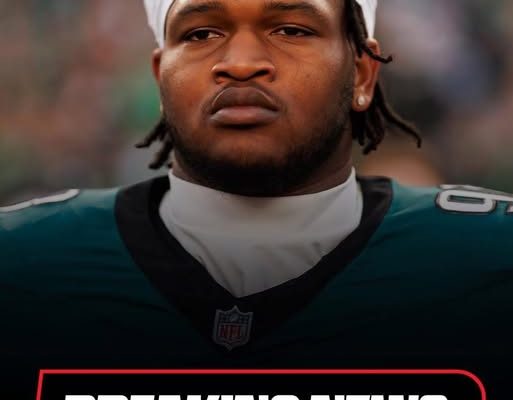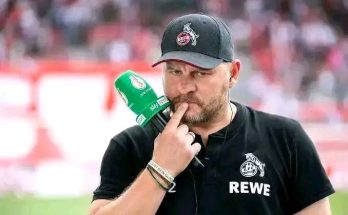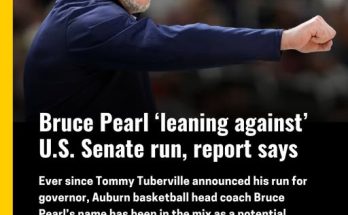The NFL has handed down a major punishment to Philadelphia Eagles defensive tackle Jalen Carter after his actions in a heated rivalry game sparked outrage across the league. According to league officials, Carter has been fined \$57,222 for spitting on Dallas Cowboys quarterback Dak Prescott during the Eagles-Cowboys matchup, an incident that drew immediate attention when Carter was flagged, then ejected from the game. On top of the fine, the league has ruled that the ejection itself will count as a one-game suspension, meaning Carter has already served his penalty in terms of missed game time. While many fans debated whether the punishment was too harsh, too lenient, or just right, Carter and his camp have made it clear that they want to move forward without dragging this controversy any longer. His agent, Drew Rosenhaus, released a statement saying, “After talking to the Eagles, the NFL and the NFLPA, Jalen has decided not to appeal and focus on the Chiefs game.” That decision signals Carter’s willingness to own up to what happened and shift his attention back to football, but it also leaves plenty of room for discussion among fans and analysts about accountability, sportsmanship, and the growing list of fines and suspensions in today’s NFL.
The incident itself unfolded during one of the most emotionally charged rivalries in professional sports. Eagles-Cowboys matchups are always filled with intensity, and both teams tend to elevate their play when they face each other. For Carter, a young defensive tackle with a reputation as one of the most disruptive forces in the league, the pressure was already high. The Eagles’ defensive line prides itself on physicality and relentless energy, and Carter is often at the center of that chaos. However, there is a fine line between aggressive play and unsportsmanlike behavior, and when Carter lost his composure by spitting on Prescott, it crossed into territory that the NFL takes seriously. Spitting on an opponent is seen as one of the ultimate signs of disrespect on the field, and league officials wasted no time in making an example out of him.
The fine of \$57,222 is substantial, especially when compared to other penalties that players have received for unsportsmanlike conduct or unnecessary roughness. While some fines come in the \$10,000–\$20,000 range for late hits or taunting, Carter’s punishment was more than double that, reflecting how serious the league viewed his actions. Beyond the financial penalty, the ejection from the game arguably hurt the Eagles just as much, if not more. Philadelphia relies heavily on Carter’s presence in the trenches, and losing him early meant the Cowboys had a chance to exploit matchups without one of the Eagles’ biggest defensive weapons on the field. The ripple effect of that moment impacted not just Carter’s reputation but also his team’s ability to compete in a crucial NFC East battle.
Now, the fact that Carter and Rosenhaus have decided not to appeal the punishment is telling. In many cases, players will push back against fines or suspensions in hopes of getting them reduced, especially if they believe the league was excessive. Carter’s decision not to fight it could be interpreted as an admission of wrongdoing, or simply as a recognition that prolonging the situation would do more harm than good. Instead of spending weeks tied up in appeals and media scrutiny, Carter and the Eagles want to move forward and shift their energy toward preparing for their upcoming matchup against the Kansas City Chiefs, a game that carries significant playoff implications.
From a broader perspective, this incident raises important questions about sportsmanship in professional sports. The NFL has long been a league where emotions run high, especially in rivalries like Eagles-Cowboys, but there is a line of professionalism that players are expected to uphold. While fans love the intensity and raw emotion that comes with football, actions that show blatant disrespect, like spitting, are universally condemned. It’s not just about protecting opponents from unnecessary aggression—it’s also about maintaining the integrity of the game. For many observers, the fine and suspension send a clear message that such behavior will not be tolerated, no matter how heated the competition becomes.
Still, there are voices in the football community who feel the league might have gone overboard. Some argue that the ejection itself was already a significant punishment in the moment, and adding a \$57,222 fine on top of it seemed excessive. Others point out that Carter is a young player who has shown flashes of greatness but also moments of immaturity, and that incidents like these should be met with discipline but also an opportunity for growth. In that sense, the punishment could serve as both a financial deterrent and a learning experience, forcing Carter to reflect on his actions and the consequences they bring.
On the other side of the debate, there are those who believe the NFL could have gone even further. Spitting on an opponent is often considered one of the most disrespectful acts in sports, and some critics believe Carter should have been suspended for an additional game beyond the ejection. From that perspective, the league’s decision to count the ejection as his suspension rather than imposing a separate one-game ban was seen as lenient. The NFL has consistently emphasized its efforts to clean up the game’s image and promote sportsmanship, and moments like this test how seriously the league enforces that commitment.
For Dak Prescott, the incident placed him in an uncomfortable spotlight. Prescott is widely respected around the league as a leader, competitor, and professional, and being spit on during a game was something that even he admitted was hard to shake. While Prescott chose not to escalate the situation in the media, many of his teammates voiced frustration at the disrespect shown to their quarterback. Cowboys fans were particularly vocal on social media, with many demanding a harsher punishment for Carter. Meanwhile, Eagles fans have been divided—some defending their player and chalking the incident up to rivalry tensions, others admitting that Carter crossed a line and embarrassed the team with his behavior.
Carter’s decision to not appeal may help cool the flames of controversy, but his reputation will certainly be impacted in the short term. The NFL is a league where perception matters just as much as performance, and players who develop a reputation for dirty play or lack of composure can quickly find themselves under a microscope from referees, fans, and even teammates. For Carter, this becomes a moment that defines whether he can learn and mature, or whether it becomes the beginning of a pattern that overshadows his immense talent on the field.
The Eagles organization has also been careful in how it responds. Internally, the team knows Carter is too valuable a player to alienate, but publicly they have echoed the NFL’s sentiment about maintaining professionalism and moving forward. Head coach Nick Sirianni has emphasized accountability while also expressing support for Carter’s growth. This balancing act is common in professional sports, where organizations must walk the line between disciplining players and keeping them engaged and focused on the ultimate goal of winning games.
Looking ahead, the Chiefs game becomes a test not just of Philadelphia’s playoff push but also of Carter’s ability to bounce back from adversity. Fans and analysts alike will be watching closely to see how he handles himself, both in terms of discipline and performance. If Carter comes out focused, dominant, and committed to playing within the rules, it could go a long way toward rebuilding trust and shifting the narrative back to his on-field ability. On the other hand, another lapse in composure could reinforce negative perceptions and lead to even harsher consequences from the league.
All of this brings us to the larger conversation about rivalries, emotions, and player conduct. Football is a game of intensity, and rivalries like Eagles-Cowboys thrive on passion. But when that passion boils over into disrespectful actions, it undermines the values of competition and fair play that fans ultimately cherish. The NFL’s role in balancing the entertainment value of heated rivalries with the need for discipline is a constant challenge, and this incident is another reminder of how difficult that balancing act can be.
So where does this leave the conversation among fans? That’s where your voices matter. Do you believe the NFL’s fine of \$57,222 was fair, excessive, or not enough? Should Carter have faced an additional suspension beyond the ejection, or was the league right to count the ejection as punishment served? How do you view Carter’s decision not to appeal—was it a sign of maturity and accountability, or simply a way to avoid dragging things out? And what about the broader question of sportsmanship in rivalries—should players be held to a higher standard even when emotions are at their peak?
This incident has all the ingredients of a conversation that will linger in football circles for weeks, especially with the Eagles set to face another tough opponent in the Chiefs. Carter’s response, Prescott’s composure, and the league’s handling of the situation all factor into a story that goes beyond one game and touches on the culture of professional football as a whole. Whether you’re an Eagles fan, a Cowboys fan, or just someone who loves the NFL, this is the kind of moment that sparks debate and brings out strong opinions on what the league should stand for.
What do you think—did the NFL get it right, or should the punishment have been different? Do you think Carter will bounce back and learn from this, or will it continue to cast a shadow over his career? Share your thoughts in the comments below, because this is a discussion that every football fan has a stake in. The NFL is built on passion, rivalries, and moments that test the line between competition and respect, and your perspective adds to the larger conversation about where that line should be drawn.



